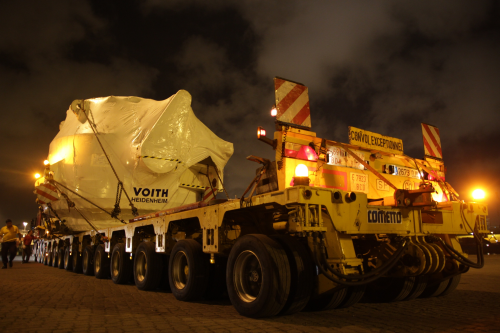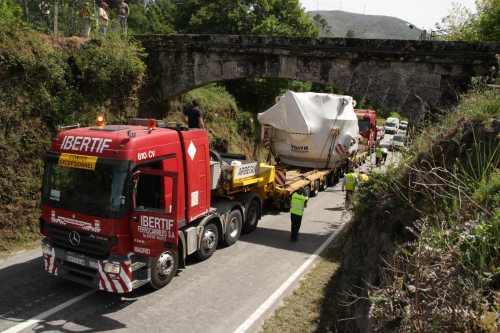

In mid-May 2015, Voith Hydro successfully transported a 170-metric-tonne spherical valve from Shanghai to the new Frades II pumped-storage plant in northwestern Portugal. The component, which was fabricated in Asia, was shipped via Rotterdam to the Portuguese port of Leixeos and transported from there to its destination by a special truck.
“Our biggest challenge in getting a just-in-time delivery of such a large component in the first place was coordinating the interfaces between the various carriers and everyone else involved in the transport on the journey from China to Europe. The transport time as such was around eight weeks in the end as planned, but the preparation took much longer,” says Stephan Pfeuffer, Head of Shipping at Voith Hydro Heidenheim.
Overcoming obstacles
During the two-day journey over Portugal's roads, the 40-metre-long and five-metre-high special load had to negotiate obstacles like narrow winding roads and low bridges. Due to driving conditions, the transport could only move on with walking speed for the last 25 kilometres. “That only works with detailed planning and close consultation with the freight company and local authorities. Ultimately, the success of the transport operation hangs on just a few centimetres,” continues Stephan Pfeuffer.
At the new Frades II pumped storage plant in northwestern Portugal, Voith delivers two variable-speed pump turbines, each with 390 MW rated power, two asynchronous motor generators, each offering 440 MVA in rated power, the frequency converter and the control systems, as well as the hydromechanical equipment for the modern pumped storage power plant. The system is set to go on stream this year to become the largest variable-speed pumped-storage power plant in Europe.
Variable speed pump turbines
The variable speed pump turbines are what make Frades II special. “The key element of this plant is a special asynchronous motor-generator: the DFIM, or doubly fed induction machine,” says Wieland Mattern, Project Manager for Voith Hydro in Heidenheim.
“In contrast to a conventional synchronous machine that always turns at a fixed speed in time with the 50 Hz grid frequency, in the new DFIM machines the mechanical rotation speed is decoupled from the grid frequency, and can vary.”
This has two main advantages.
First: the new systems allow a fast and flexible response to active and reactive demand from the power grid. Whereas a traditional facility is either on or off in both motor and generator mode, the new units can be run at any speed within a given speed range, to match the current demands on the network. This was a major factor in the bidding process, and will be increasingly important in other markets, too.
Second: variable-speed facilities offer additional stability in cases of voltage drop, reducing the likelihood of a blackout and enabling the system to come back into operation much faster following such an event, as compared with traditional, fixed-speed turbines.
And it is precisely this combination of electricity storage and variable pump output that is crucial to the ongoing expansion of wind power. Frades II will be installed in an underground cavern, with a height difference between upper and lower reservoirs of 420 metres.
Portugal is banking on renewable energies
For electricity generation, Portugal is relying primarily on wind, solar and hydropower. Since the turn of the millennium, the country has multiplied its capacities for electricity generation from wind power.
In 1998 Portugal had just 51 MW of installed capacity in wind turbine facilities; just 12 years later this had risen to 3,702 MW, and there are plans to extend capacity to 5,400 MW. High-capacity pumped storage plants form the backbone for the further expansion of power generation from renewable energy sources. Almost 42% of renewable energy in Portugal comes from hydropower.
Voith sets standards in the markets of energy, oil and gas, paper, raw materials and transport & automotive. Voith employs more than 39,000 people in over 50 countries worldwide, and is one of the largest family-owned companies in Europe.





